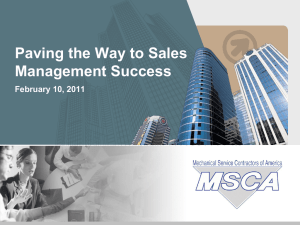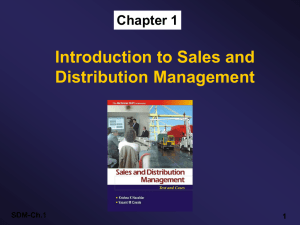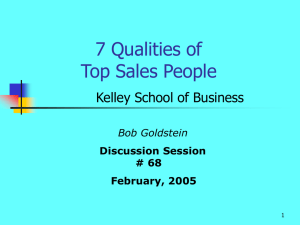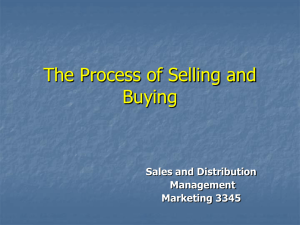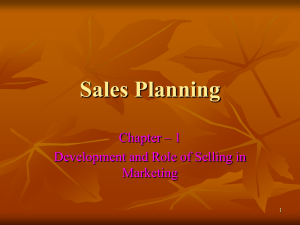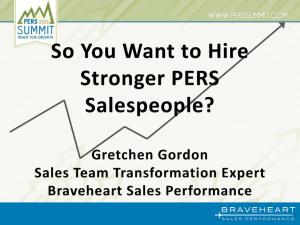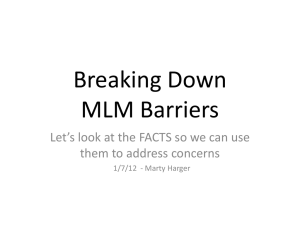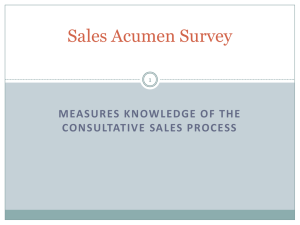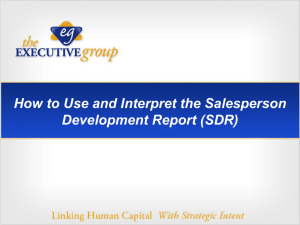Overview of Selling
advertisement
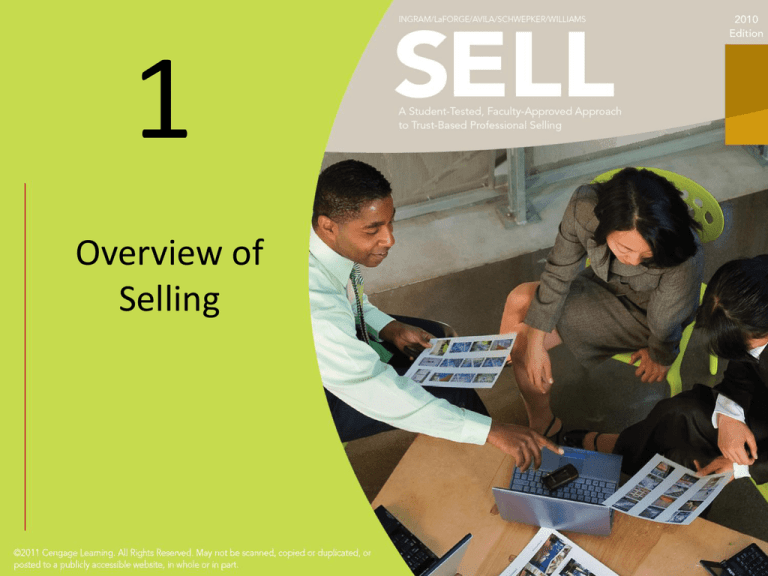
1 Overview of Selling Learning Objectives 1 L 1 Define personal selling and describe its unique characteristics as a marketing communications tool. L 2 Distinguish between transaction-focused traditional selling and trust-based relationship selling, with the latter focusing on customer value and sales dialogue. L 3 Describe the evolution of personal selling from ancient times to the modern era. Learning Objectives L 4 Explain the contributions of personal selling to society, business firms, and customers. L 5 Discuss five alternative approaches to selling. L 6 Describe the three primary roles fulfilled by consultative salespeople. L 7 Understand the sales process as a series of interrelated steps. 1 Key Thoughts 1 • Selling has been around since there were goods to trade. • The role of the salesperson has evolved . . . becoming more professional. • Salespeople play an important role in creating and maintaining a strong economy. • Salespeople are solution providers. • Sales is a process focusing on initiating, developing, and enhancing customer relationships. Personal Selling – Defined An important part of marketing that relies heavily on interpersonal interactions between buyers and sellers to initiate, develop, and enhance customer relationships. 1 Trust-Based Relationship Selling Requires that salespeople earn customer trust and that their selling strategy meets customer needs and contributes to the creation, communication, and delivery of customer value. 1 Customer Value The customer’s perception of what they get for what they have to give up. 1 Importance of Sales Dialogue Sales Dialogue: business conversation between buyers & sellers that occur as salespeople attempt to initiate, develop, & enhance customer relationships. • Allows for more thorough qualifying. • Demonstrates sincere interest in the prospective customer. • Helps Determine prospective customer’s unique needs. • Ensures meaningful presentation of valueadded solutions. • Promotes open communication and satisfaction feedback. 1 Transaction-Focused Selling vs. Trust-Based Relationship Selling 1 Transaction-Focused Selling vs. Trust-Based Relationship Selling 1 Evolution of Personal Selling Peddlers selling door to door . . . served as intermediaries 1800s Industrial Revolution Selling function became more structured Post-Industrial Revolution Business organizations employed salespeople 1900s War and Depression 2000s Modern Era Selling function becoming more professional 1 Evolution of Personal Selling (The past several decades) Canned Sales Presentation: sales presentations that include scripted sales calls, memorized presentations, and automated presentations. Sales Professionalism: a customeroriented approach that uses truthful, non-manipulative tactics to satisfy the long-term needs of both the customer and the selling firm. 1 Continued Evolution of Personal Selling 1 Is Sales a Profession? • • • • • • Knowledge base Contribution to Society Defined Culture and Organization Professional skills Autonomy Code of Ethics 1 Contributions of Personal Selling: Salespeople and Society • Salespeople help stimulate the economy. • Salespeople help with the diffusion of innovation. 1 Contributions of Personal Selling: Salespeople and the Employing Firm • Salespeople generate revenue. • Salespeople provide market research and customer feedback. • Salespeople become future leaders in the organization. 1 Contributions of Personal Selling: Salespeople and the Customer • Salespeople provide solutions to problems. • Salespeople provide expertise and serve as information resources. • Salespeople serve as advocates for the customer when dealing with the selling organization. 1 Alternative Personal Selling Approaches • • • • • Stimulus Response Selling Mental States Selling Need Satisfaction Selling Problem Solving Selling Consultative Selling Adaptive Selling: the ability of a salesperson to alter his/her sales messages and behaviors during a sales presentation or as they encounter different sales situations and different customers. 1 Stimulus Response Selling Simple in design; assumes conditioned response improves likelihood of success; a risky and unreliable strategy. 1 Mental States Selling Assumes buyer can be led through mental states; promotes one-way communication; a risky and unreliable strategy. 1 Need Satisfaction Selling Interact with buyer to determine existing needs; present solutions to needs; solutions limited to seller’s products. 1 Problem Solving Selling Interact with buyer to determine existing and potential needs; present multiple solutions not limited to seller’s products. 1 Consultative Selling The process of helping Long-Term customers reach their Ally strategic goals by using the products, Business services, and Consultant expertise of the Strategic selling Orchestrator organization. 1 The Sales Process: An Overview 1 Selling Foundations Initiating Customer Relationships Selling Strategy Developing Customer Relationships Enhancing Customer Relationships The Sales Process - Overview 1 The Sales Process: Selling Foundations In order to be successful in today’s global business environment, salespeople must have a solid relationship building foundation. They must: Be Trustworthy Behave Ethically Understand Buyer Behavior Possess Excellent Communication Skills 1 The Sales Process: Selling Strategy In order to be successful in today’s global business environment, salespeople must also think and act strategically. The must develop strategies for: Each Sales Call Each Customer Their Sales Territories Each strategy is related to the other 1 The Sales Process Initiating Customer Relationships Developing Customer Relationships • Sales Prospecting Presentation Delivery • Earning Preapproach Customer Commitment Adding Value through Follow-up, Self• Presentation Planning leadership, and Teamwork • Approaching the Customer 1 Enhancing Customer Relationships 1 Module One – Appendix Sales Careers Characteristics of Sales Careers • • • • • • • Job Security Advancement Opportunities Immediate Feedback Prestige Job Variety Independence Compensation 1 Job Security Selling skills are readily transferable from industry to industry….and the need for good salespeople will never go away. Accordingly, good salespeople have opportunities within and across industries. 1 Advancement Opportunities Salespeople are familiar with the market, the customers, and the products. In addition, good salespeople have great interpersonal skills. These attributes help to make salespeople good candidates for leadership in the organization. 1 Immediate Feedback & Prestige Customer responses to the salesperson’s efforts are typically immediate…providing the salesperson performance feedback and the opportunity to adjust “on the fly.” The role of the professional salesperson is not well known by the general public and is eclipsed by negative stereo types . . . but that is slowly changing. 1 Job Variety and Independence Professional selling is rarely the same from day-to-day. The word “routine” doesn’t apply. Usually, salespeople are accountable for attaining certain goals…how they get there is up to them. There is no “time-clock” and no taskmaster. 1 Compensation Good salespeople usually earn an income well above the national average. Many salespeople earn six figure incomes (or higher). Income is most often tied directly to performance. 1 Characteristics of Successful Salespeople 1 • • • • Empathy Ego Drive Ego Strength Interpersonal Communication Skills • Enthusiasm

